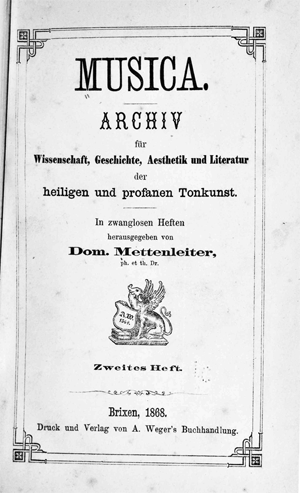Musica: Archiv für Wissenschaft, Ästhetik und Literatur der heiligen und profanen Tonkunst
Prepared by Peter Sühring
Online only (2023)

The short-lived Musica. Archiv für Wissenschaft, Ästhetik und Literatur der heiligen und profanen Tonkunst [Musica. Archive for science, aesthetics and literature of sacred and profane music, RIPM code MSA] may not have been intended to be a periodical, but it was announced from the outset as being published in loose succession. Only two issues appeared, two years apart. Both were published by Verlag der Buchhandlung A. Weger in Brixen, in cooperation with Verlag Coppenrath in Regensburg and Elsaesser & Waldbauer in Passau.
The first issue numbered 88 pages and the second issue was numbered 91 to 272. In the first issue, in addition to the editor's articles on church music, there were the following categories: Letter prints (“Echo verklungener Harfen”), a journal review, a “Hall of Honor” with listed awards for musicians, and a necrology. Both issues contain reprinted excerpts from medieval treatises in the original language. The review section (“Bücher und Musikschau”) of the first volume was divided into the categories: Books and vocal music, that of the second volume into Komposition and Bücherschau. Both issues concluded with music supplements in the form of printed music of historical church and chamber music. The magazine was printed throughout in single column format and in Antiqua font. There was no advertising.
Dominicus Mettenleiter (1822-68) was the editor and sole author. He was a studied theologian and philosopher, but as a church musician and music historian he was self-taught. After completing his basic training with his father, he continued his education using old textbooks and instrumental schools. At the age of 28 he went to Regensburg as a pastor and organist, where he died at the age of 46. He wrote a biography of Thomas Aquinas, devotional and music books, as well as a music history of the city of Regensburg. He published his musicological and music history studies in Musica.
In Musica, Mettenleiter ensured a concentration on church music content and topics, closely linked to questions of the Catholic liturgy and the role of music in worship and in the church in general. The historical development and contemporary use of the organ was an important topic. The second problem was the current form of ancient Gregorian chant in the church. To this end, he published the results of his research in old manuscripts and prints and published readings and additions to the treatises by Guido of Arezzo and Franco of Cologne.
In addition, and in defense of his conservative views, he published music-aesthetic writings by older church musicians from the seventeenth century such as Willibald Kobold and M. Joh. Mich. Schmidt, which he summarized in a treatise edited by him, as well as a work by Joseph Riepel (1709-82) on the art of expression by Benedetto Marcello. Mettenleiter also published compilations of older documents in defense of instrumental music and its derivation from biblical and ancient times. He principal concern was a criticism of the current state of ecclesiastical and secular musical life, for which he published several accusatory and pamphlet-like articles in which he diagnosed a compositional and moral decline, especially in the field of opera. His reviews of contemporary music literature also followed this track. In the field of secular music, he particularly defended the role and importance of chamber music with his heroes, Haydn, Mozart and Beethoven.
The two issues of the magazine are a typical example of the possibilities and limits of reactionary music historiography and criticism. Although this method succeeds in discovering and drawing on many important historical documents to represent and defend a certain line of tradition, it is unable and unwilling to understand and accept new, modern views and practices that go against this line. Mettenleiter's tendency is not to be equated with Catholic Cäcilianism. He praises singing and considers it particularly valuable, especially when it correctly appeals to the community of believers, but he does not claim that it is the only music practice allowed, rather emphasizing the use of instruments in church music, especially organ and wind instruments which stand out positively because of their origins in the religious rites of biblical times and in Greco-Roman antiquity.
This RIPM index was based on a copy of the journal held by the Library of Congress.
